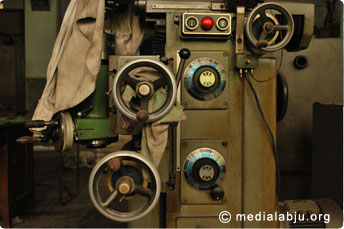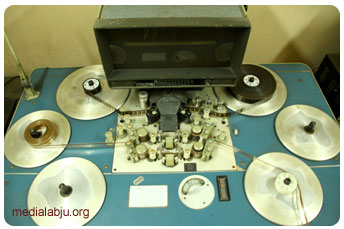
 |

The National Instruments Limited was set up under the name of 'Mathematical Instrument Maker' in 1830 by George Everest. It was taken over by the Indian Government in 1957 and re-christened 'National Instruments'. The new factory was built in the academic-industrial-refugee belt of Jadavpur. NIL was a premier manufacturer of precision optical instruments and the maker of the first indigenous camera in India, the National 35. Like many public sector units it fell on bad times in the late 1980s and finally stopped production in 2003, when most of its employees were forced to leave. In 2009, Jadavpur University took over the factory premises to build a new campus.
The Media Lab undertook a major documentation project on the closed National Instruments Limited factory in 2009. More than ten photographers were commissioned by the Lab to create an extensive archive of stills and video over six months that produced floor by floor and room by room records of all the tools, objects and machines lying on the premises, testimonies of ex-employees, their personal effects, and other objects that made the place one of the most fascinating instances of industrial ruins.
Artists and filmmakers have been invited to respond to the massive stills and video archives. This has generated a number of videos, a blog, a sound installation and exhibitions. It is an ongoing project.

In 1980 West Bengal Colour Film & Sound Laboratory Corporation Limited was incorporated as a wholly owned Government of West Bengal undertaking with the object of promoting the film industry in the state. The name of the company was changed to West Bengal Film Development Corporation Limited (WBFDCL) with effect from July 1, 1983. And in 1986 the state government-owned first colour film laboratory in West Bengal was set up in sector IV under the aegis of WBFDCL and christened Rupayan by Satyajit Ray. The lab provided post-production facilities to filmmakers from the East so that they did not have to go to the private laboratories of other cities. But after a few years, since the infrastructure was not upgraded, Rupayan started incurring losses. The arrival of the digital era of cinema accelerated the loss. State government planned to privatize the lab which had to be scrapped. The government also tried to reconstruct the lab through the public-private partnership (PPP). But state government finally decided to shut it down in February, 2013.
The Media Lab undertook a documentation project on Rupayan film Laboratory in 2012. Photographers went there from the Media Lab to create an archive of stills and video. The Media Lab interviewed the technicians of Rupayan lab and recorded the tools, objects and machines of Rupayan. .